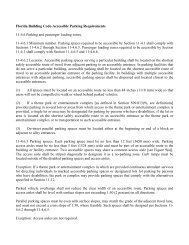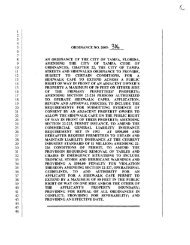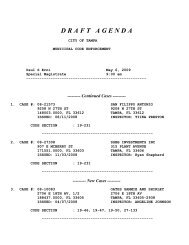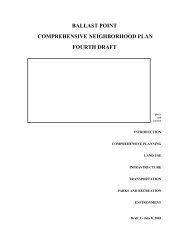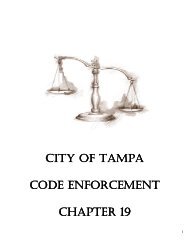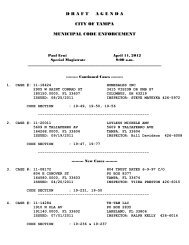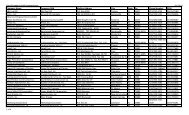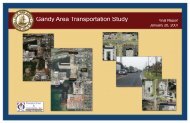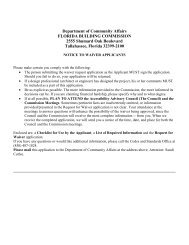purchasing department job order contracting audit ... - City of Tampa
purchasing department job order contracting audit ... - City of Tampa
purchasing department job order contracting audit ... - City of Tampa
- No tags were found...
Create successful ePaper yourself
Turn your PDF publications into a flip-book with our unique Google optimized e-Paper software.
CITY OF TAMPAPam Iorio, MayorInternal Audit DepartmentRoger Strout, Internal Audit DirectorJuly 20, 2010Honorable Pam IorioMayor, <strong>City</strong> <strong>of</strong> <strong>Tampa</strong>1 <strong>City</strong> Hall Plaza<strong>Tampa</strong>, FloridaRE: Job Order Contracting, Audit 10-01Dear Mayor Iorio:Attached is the Internal Audit Department's report on Job Order Contracting.The Purchasing Department has already taken positive actions in response to ourrecommendations. We thank the management and staff <strong>of</strong> the Purchasing Department,Contract Administration, Facility Management, the <strong>City</strong>’s JOC Project Managers, JOCContractors, and JOC Consultant for their cooperation and assistance during this <strong>audit</strong>.Sincerely,/s/ Roger StroutRoger StroutInternal Audit Directorcc:Darrell Smith, Chief <strong>of</strong> StaffBonnie Wise, Chief Financial OfficerSteve Daignault, Administrator <strong>of</strong> Public Works & Utility ServicesMark Huey, Administrator <strong>of</strong> Economic and Urban DevelopmentSantiago Corrada, Administrator <strong>of</strong> Convention Center, Tourism, Recreation, andCultural ArtsGreg Spearman, Director <strong>of</strong> PurchasingIrvin Lee, Director <strong>of</strong> Public WorksDavid Vaughn, Director <strong>of</strong> Contract Administration306 E. Jackson Street, 7E • <strong>Tampa</strong>, Florida 33602 • (813) 274-7159 • FAX: (813) 274-7176
PURCHASING DEPARTMENTJOB ORDER CONTRACTINGAUDIT 10-01BACKGROUNDThe <strong>City</strong>’s Job Order Contracting (JOC) program is based on a competitively bid indefinitedelivery, indefinite quantity contract between the <strong>City</strong> and pre-selected constructioncontractors. Contractors bid an adjustment factor to be applied to a catalog <strong>of</strong> pre-pricedconstruction tasks. While contractors are guaranteed a minimum level <strong>of</strong> work, the <strong>City</strong> isunder no obligation to continue to work with a problem contractor. Therefore, contractorscompete for JOC contracts on the basis <strong>of</strong> performance as well as price.JOC originated in the 1980s to mitigate some <strong>of</strong> the inherent problems with traditionalbidding methods. One apparent advantage <strong>of</strong> JOC over traditional bidding is the elimination<strong>of</strong> bid solicitation for each project. Individual project contracts, detailed plans andspecifications, and bid evaluation are not necessary. JOC projects are determined by a scope<strong>of</strong> work prepared by the user <strong>department</strong>. The contractor breaks the project down into tasksand quantities, which are extended by catalog pricing. A fixed fee project proposal isgenerated after applying the contractor’s adjustment factor. After reviewing the detailedtasks and quantities for reasonableness, the proposal can be accepted or rejected. Thissimplified process allows projects to begin within 20 to 30 days from the date <strong>of</strong> request.Traditional methods can take up to six months or longer.Job Order Contracting Activity by Department (July 2007 to September 2009)Contract Administration $1,261,820Convention Center 1,045,491Parking 57,390Parks & Recreation 619,055Riverwalk 32,650Solid Waste 42,128Stormwater 207,184Traffic Engineering 305,103Traffic Operations 837,421Traffic Signals 189,927Transportation 2,819,887Water 2,125,513Total $9,543,568JOC Consultant Fees $318,218Consultant Fees to Total Construction Costs 1 3.3%Source: PROGEN (JOC Financial Processing and Project Tracking S<strong>of</strong>tware)1 Exhibit A <strong>of</strong> the Consultant’s Agreement allows for additional fees based on specified hourly labor rates foradditional services provided to the <strong>City</strong>. The <strong>City</strong> has not requested or received any such additional services.
PRICE PROPOSAL REVIEWSAUDIT ISSUEContractor price proposals were not always adequately reviewed prior to acceptance.OBSERVATIONSA sample <strong>of</strong> contractor price proposals was reviewed with their respective Project Managerto determine whether the proposals were adequately reviewed prior to acceptance. As aresult, it became evident that varying methods were used to evaluate the price proposals.Most indicated that tasks and quantities were reviewed for reasonableness given the project;others looked at the bottom line, and or discussed the project with knowledgeable personnelto ensure the total cost was reasonable. No one indicated that the contractor's adjustmentfactor was reviewed for accuracy. Nearly half <strong>of</strong> the Project Managers interviewed could notprovide support for the pricing <strong>of</strong> non-prepriced items.By reviewing price proposal details with the Project Managers, we noted that a contractorused an incorrect adjustment factor when extending task costs (one project, three task lineitems). This resulted in an overcharge <strong>of</strong> $15,561.40. As a result, we requested the JOCConsultant to create a report <strong>of</strong> non-prepriced items that detailed the adjustment factors usedto extend task costs. The report was used to identify two more tasks where the wrong factorwas used. These two errors resulted in overcharges <strong>of</strong> $1,027.31. On another project, thequantities <strong>of</strong> a few tasks did not agree to the "take-<strong>of</strong>f" or supporting calculation <strong>of</strong> the taskline item (overcharges minimal). On one other project, two tasks used daily rates when,based on the quantities entered for other tasks, weekly rates should have been used(overcharges minimal). The <strong>City</strong>'s JOC Coordinator subsequently requestedcredits/reimbursements for the identified overcharges.CRITERIAThe "Purchasing Requirements for <strong>City</strong> Project Managers" requires a review <strong>of</strong> thecontractor price proposal prior to acceptance. While this document is not part <strong>of</strong> the <strong>City</strong>'sPurchasing Manual, it does describe the process and document the flow <strong>of</strong> the JOC Program.It was developed for reference by the Project Managers.RISK DESCRIPTIONErrors in price proposals could go undetected without proper detailed reviews, which couldresult in overcharges to the <strong>City</strong>.RECOMMENDATION 1Project Managers should ensure that the tasks and quantities used in price proposals areappropriate and reasonable, correct adjustment factors are used when extending task costsand supporting calculations ("take-<strong>of</strong>fs") agree to the quantities entered. During the <strong>audit</strong>,the JOC Coordinator implemented new procedures to ensure non-prepriced items areadequately supported.4
To help ensure compliance with price proposal reviews, the Purchasing Department shouldexpand its "Purchasing Requirements for <strong>City</strong> Project Managers" to include procedures onhow to adequately review a JOC price proposal. These procedures should be periodicallyreinforced at the monthly JOC management meetings.MANAGEMENT'S RESPONSEPurchasing agrees with this finding in its entirety. <strong>City</strong> Project Managers all received trainingon reviewing Price Proposals during program inception in 2007. Refresher training will beconducted.Action Plan:1a) The JOC Coordinator will create an addition to the “Purchasing Requirement for <strong>City</strong>Project Managers” detailing how to adequately review Price Proposals.1b) The JOC Coordinator and The Gordian Group will conduct a mandatory Price ProposalReview class for all active Project Managers. Project Managers will have to complete thisclass before they will be authorized to approve Price Proposals.1c) Periodically, the importance <strong>of</strong> Price Proposal review will be mentioned at JOCManagement Meetings and highlighted in the monthly JOC Update email.Target Date for Completion:1a) September 30, 20101b) September 30, 20101c) On-going5
RECURRING CONSTRUCTION PROJECTSAUDIT ISSUEWhile JOC has advantages over traditional procurement methods (i.e. reduced costs <strong>of</strong>preparation and bidding, potentially improved quality <strong>of</strong> work because there are noassurances <strong>of</strong> future work, and quicker construction time lines), it may be advantageous touse cost plus or unit-price contacts, or develop specialized JOC contracts to attract additionalbidders for recurring construction projects.OBSERVATIONSA recurring JOC construction project (sidewalk program) realized significant savings when aunit-price contract was competitively bid. The savings were verified by comparing cancelledJOC work <strong>order</strong>s to the same work performed under the unit-price contract. Anotherrecurring JOC project (water meter installation and restorations) uses JOC only because <strong>of</strong>enhanced customer service. A cost analysis, prepared by the <strong>department</strong>, showed thataverage JOC project costs were higher. The <strong>department</strong> has a furnish and install agreementin place; however, the contractor awarded the contract would have to stop work on other <strong>City</strong>projects, which would delay their completion. A third JOC recurring project (LED trafficlight change outs) was identified where a unit-price agreement was in place; however, thespecific tasks related to the work were not part <strong>of</strong> the agreement. These tasks will be addedto the contract specifications when it is rebid.CRITERIABased on the experience <strong>of</strong> the <strong>City</strong>'s sidewalk program and the water meter installationanalysis, it appears recurring construction projects are better suited to using more traditionalprocurement methods or the development <strong>of</strong> a specialized JOC contract to attract additionalbidders.RISK DESCRIPTIONBecause recurring construction projects are not unique and typically do not involve any timeconstraints, the use <strong>of</strong> competitive bidding or development <strong>of</strong> a specialized JOC contract toattract additional bidders would help ensure that the best price is obtained by the <strong>City</strong>.RECOMMENDATION 2Purchasing policies and procedures should be strengthened to include specific criteria to helpensure the most cost effective procurement method is utilized. When applicable, criteria,such as quick response times, should be included in the contract requirements.MANAGEMENT'S RESPONSEPurchasing agrees with this finding. Purchasing will incorporate an analysis <strong>of</strong> recurringprojects when they do not meet one <strong>of</strong> the following known criteria for utilizing JOC:• Time constraints• Small total volume• Interim solution while contract is bid6
In addition, the recent bid has shown a significant drop in pricing as indicated by a 24%reduction when comparing 2007 to 2010 JOC factors. Therefore, <strong>purchasing</strong> will also conduct anew analysis for current recurring projects to ensure cost effectiveness.Action Plan:2a) Purchasing will conduct an analysis if JOC is being utilized as the primary method forrecurring projects and does not fall within one <strong>of</strong> the known criteria. The analysis andcorresponding decision to utilize JOC will be conducted by the using <strong>department</strong> and<strong>purchasing</strong>. The analysis may consist <strong>of</strong> any <strong>of</strong> the following:• Market Research• Request for Information• Quotation for a single <strong>job</strong> within the project• Formal Competitive Bid• Review <strong>of</strong> existing/past contracts2b) Revise the JOC Policy to include a review process for recurring projects.Target Date for Completion:2a) December 31, 2010 for current recurring project and within 6 months as new recurringprojects are identified within JOC2b) December 31, 20107
CONTRACT ADMINISTRATION DEPARTMENTAUDIT ISSUEWhile most <strong>of</strong> the JOC Project Managers appeared more than capable to administer theirrespective projects, others do not appear to have the requisite background in the variousconstruction trades to adequately monitor construction. The language used in the PurchasingProcedures Manual, Section 14.0, Job Order Contracting, is unclear with respect to when theContract Administration Department's involvement is required.OBSERVATIONSThe Mayor established the Contract Administration Department (Executive Order 2005-1) toenhance "the efficiency and effectiveness <strong>of</strong> <strong>City</strong> government" and "provide improved publicworks, utilities, roadway and infrastructure services to the public." The new <strong>department</strong>consolidated the functions that resided in other <strong>City</strong> <strong>department</strong>s "relating to theestablishment and execution <strong>of</strong> design and construction <strong>of</strong> public improvements and relatedservices for such contracts." "Such contracts" include "design, construction, engineeringstudies, engineering/architectural and related services type contracts as well as relatedagreements as assigned by the Administration."Given the above, JOC Project Managers generally prefer to administer their own projects toensure timely completion (one <strong>of</strong> the advantages <strong>of</strong> the JOC program). While all JOCprojects reviewed appeared adequately managed and successfully completed, a few projects,which involved more than a single construction trade and required both permitting andinspections, may have benefited from the oversight <strong>of</strong> a more experienced Project Manager.CRITERIAThe Purchasing Procedures Manual, Section 14.0, Job Order Contracting, requires projectcoordination through the Contract Administration Department if "the project requirespermits, pr<strong>of</strong>essional seals on documents and construction testing and inspection." Thisstatement appears all inclusive, indicating that the Contract Administration Departmentshould coordinate the project only when all requirements are met. The policy continues that"if the project does not involve any <strong>of</strong> these requirements, the project will be coordinateddirectly with the Purchasing Department." This statement implies that if any <strong>of</strong> the fourrequirements are met the project should be coordinated by Contract Administration.RISK DESCRIPTIONConstruction deficiencies may go undetected without adequate oversight by someoneexperienced in the applicable construction trades.RECOMMENDATION 4Purchasing Procedures Manual, Section 14.0, Job Order Contracting, should be revised toensure Contract Administration Department's involvement when permits, pr<strong>of</strong>essional sealson documents, construction testing, or inspections are required.10
MANAGEMENT'S RESPONSEPurchasing agrees with this finding in its entirety. In addition to contradictions between theJOC Policy and JOC Procedure, neither clearly defines the terminology nor clearly identifieswhen and how the Contract Administration Department (CAD) should be involved in a JOCproject. As currently written, the Policy would require that CAD be involved in every JOCproject, since every JOC project requires some form <strong>of</strong> inspection. Additionally, permits can be<strong>of</strong> varying complexity and type. Some permits, such as right-<strong>of</strong>-way, may not require CAD’sinvolvement. Currently the policy has been interpreted that CAD must be involved if stampedand sealed drawings are required.Department Project Managers initiate JOC projects. Based on the scope <strong>of</strong> the project, it is theProject Manager’s responsibility to review the project and determine if CAD should beinvolved. Sometimes Project Managers choose not engage CAD due to a significant time delayin starting construction and increased <strong>department</strong> costs due to the 12.8% CAD fee.Action Plan:4a) Purchasing will work with Contract Administration to revise the relevant portions <strong>of</strong> theJOC Policy and Procedures. As part <strong>of</strong> this revision, recommend that ContractAdministration modify their <strong>department</strong> fee structure for JOC projects.Target Date for Completion:4a) December 30, 2010.11
JOC PROJECT MANAGERS SURVEYAUDIT ISSUEAll <strong>of</strong> the <strong>City</strong>'s JOC Project Managers we surveyed believed that Job Order Contracting wasa useful procurement method for small and unique construction projects or when projectswere under significant time constraints to complete.OBSERVATIONSBelow are the Project Manager’s responses to our JOC Questionnaire:Question 1a: As you see it, what are the advantages <strong>of</strong> using the JOC Program?Summary: The most common responses for the advantages <strong>of</strong> the JOC program were: savedtime by avoiding the formal bid process and the involvement <strong>of</strong> Contract Administration,ability to handle small or unexpected projects fast, and that JOC contractors produced aquality work product.Question 1b: As you see it, what are the disadvantages <strong>of</strong> using the JOC Program?Summary: The most common response on the disadvantages <strong>of</strong> the JOC Program was thehigher costs <strong>of</strong> construction. Project Managers also disliked the program s<strong>of</strong>tware.Question 2: Do you have any suggestions to improve the JOC Program?Summary: The majority <strong>of</strong>fered no suggestions to improve the JOC program.Question 3: What steps do you take when you review JOC price proposals? How do youensure non pre-priced items are priced appropriately? Are these reviewing stepsdocumented?Summary: Most Project Managers indicated that they review line item tasks and quantitiesfor applicability and reasonableness. Non pre-priced item costs are researched or supportedby contractor quotes. Most do not document their review.Question 4: Do you believe that by using the JOC Program you have saved costs (includinglabor)? Are you able to provide any support for the cost savings?Summary: The majority <strong>of</strong> Project Managers did not believe the JOC program saved costs.Those that did cited their time savings.Question 5: How do you track the progress <strong>of</strong> JOC Program projects? Do you use projectlogs; maintain project files that contain progress information, or some other method?Summary: The progress <strong>of</strong> JOC Program projects was tracked using a variety <strong>of</strong> methods.12
Question 6: Do you have any comparable or similar projects that have gone through thetraditional bidding process that you are now using or have used the JOC Program tocomplete?Summary: Most did not have comparable projects that went through the traditional biddingprocess citing the projects let through the JOC program were typically unique, smallprojects. Those that did have comparable projects, indicated the projects were recurring, orprojects were started in one process, but completed using another.Question 7: Do you anticipate increasing or decreasing your use <strong>of</strong> the JOC program inFY2010? Why?Summary: A third <strong>of</strong> the Project Managers anticipated their use <strong>of</strong> the JOC program wouldbe about the same frequency in FY2010. Less than a third estimated their use woulddecrease. Less than a third indicated they could not predict their future use. Only twoproject managers felt their use would increase.CRITERIAThe narrative above summarizes JOC Project Manager's opinions <strong>of</strong> the Job OrderContacting procurement method.RISK DESCRIPTIONUsing an inappropriate procurement method may not provide the lowest cost to the <strong>City</strong>.RECOMMENDATION 5The JOC Program should be utilized only for those unique projects where the benefits <strong>of</strong> theJOC Program out weigh the potential for lower costs through traditional procurementmethods. To ensure the lowest cost to the <strong>City</strong>, each project should be evaluated againstspecific criteria to determine the proper procurement method to be used.MANAGEMENT'S RESPONSEPurchasing agrees with this finding in its entirety. The purpose <strong>of</strong> the JOC program is to reducetime and increase quality, while keeping costs as low as possible. JOC provides the best valuefor the <strong>City</strong> when efficiency is the priority for small, unique, repair, renovation, and constructionprojects.Action Plan:5a) Purchasing will continue to advise <strong>department</strong>s on selecting the best method <strong>of</strong>procurement.Target Date for Completion:5a) On-going13
COMPARISON OF PROCUREMENT METHODSAUDIT ISSUEWhile the JOC procurement method provides a significant reduction in administrative laborand overall project time when compared to the <strong>City</strong>'s formal bid process, these criteria aloneshould not determine the procurement method used.OBSERVATIONSProcurement tasks <strong>of</strong> the JOC and formal bid processes were identified with the assistance <strong>of</strong>the Purchasing Department, Contract Administration, and Facility Management. Because theformal bid process is used to award projects that may not be suitable for the JOC program,each entity was asked to prepare estimates <strong>of</strong> the direct labor hours and duration/wait time indays for an average sized project.Based on the estimates obtained, JOC administrative labor is approximately 12 to 35 hoursper project compared to 100 hours or more for formally bid projects. Total projectduration/wait time for JOC is approximately 33 days versus 100 days or more for formallybid projects.CRITERIAProcurement tasks were identified with the assistance <strong>of</strong> the responding <strong>department</strong>s, whichprovided detailed administrative labor and duration/wait time estimates.RISK DESCRIPTIONSelecting an inappropriate procurement method at project commencement could subject the<strong>City</strong> to avoidable construction costs.RECOMMENDATION 6The decision as to whether the reduced administrative labor and overall project time <strong>of</strong>feredby Job Order Contracting would result in overall cost savings to the <strong>City</strong> should bedetermined and documented prior to the start <strong>of</strong> JOC construction projects.MANAGEMENT'S RESPONSEPurchasing agrees with this finding in its entirety. Departments <strong>of</strong>ten choose JOC because thereduction in staff time and overall project time is more important than achieving the lowestprice. The overall cost to the <strong>City</strong> includes these s<strong>of</strong>t costs and the price paid to the contractor.It is important that all benefits and costs are reviewed when selecting the best method <strong>of</strong>procurement.Action Plan:6a) Purchasing will continue to advise <strong>department</strong>s on selecting the best method <strong>of</strong>procurement.Target Date for Completion:6a) On-going14



